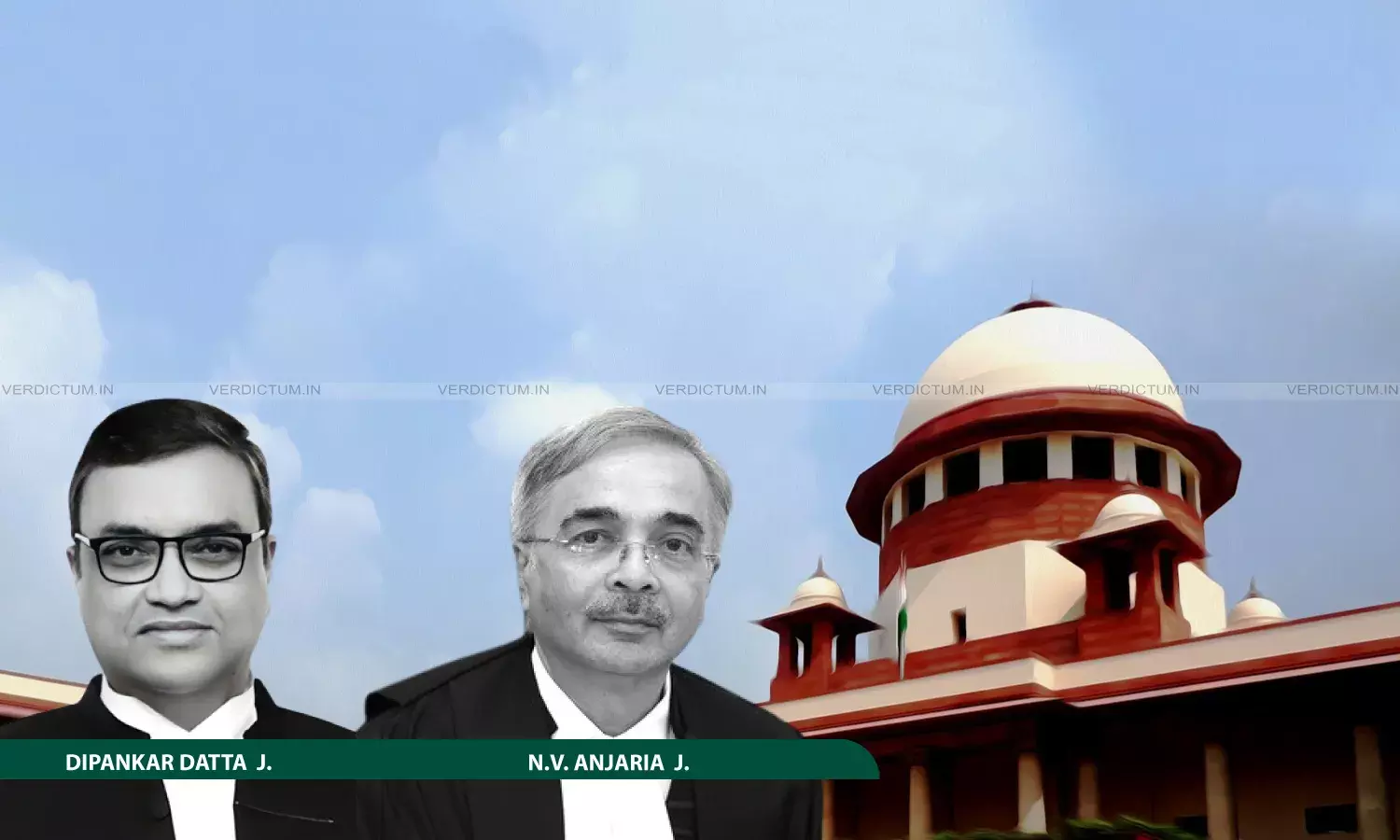Tamil Nadu Housing Board Is Custodian Of Public Property: Supreme Court Asks Litigant To Vacate Property Occupied For Over 3 Decades Without Paying Balance Sum
The Tamil Nadu Housing Board approached the Supreme Court, challenging the order directing the execution of the sale agreement in the respondent’s favor.

Justice Dipankar Datta, Justice N.V. Anjaria, Supreme Court
While observing that the Tamil Nadu Housing Board is a custodian of public property, the Supreme Court has ordered a litigant to vacate a property occupied for over 3 decades without paying the balance sum. The Apex Court also affirmed the stand of the Board that the indulgences granted to the litigant had resulted in loss of revenue to the public exchequer.
The appeal before the Supreme Court was filed by the Tamil Nadu Housing Board against the order directing the execution of the sale agreement in the respondent’s favour.
The Division Bench of Justice Dipankar Datta and Justice N.V. Anjaria said, “The Plot, being a public property, its management should prioritize the greater public good. The Board, being the custodian of public property, holds it in trust for the public and is under a duty to take decisions regarding it which serves the broader public interest best. It is to be kept in mind that any auction process by any public authority should be above reproach, guided by the principles of transparency, fairness, and reasonableness. The Board is right in stating that the indulgences granted to the respondent has resulted in loss of revenue to the public exchequer on account of inflation in market value of the property from 1986 till date.”
AOR G. Indira represented the Appellant while AOR S. Gowthaman represented the Respondent.
Factual Background
The first appellant invited sealed bids for the disposal of a Prime Commercial Plot. An open auction was conducted, and the respondent emerged as the highest bidder and was declared as such. Due to the respondent’s failure to make the initial deposit as aforesaid, the said allotment was cancelled, but as a special case, he was granted a Regular Allotment Order. Some amount remained unpaid. Accepting the request of the respondent, the Board communicated its willingness to revoke the cancellation of allotment subject to the respondent undertaking that the pending dues amounting to Rs 20,77,911 would be cleared.
Since the respondent submitted his undertaking letter belatedly, the second appellant directed the respondent to surrender the Plot to the Board. The respondent instituted a Petition before the Madras High Court. Aggrieved by the inaction of the Board in executing the sale deed even after the withdrawal of the petition, the respondent instituted another Petition before the High Court challenging the same letters of the Board.
The appellant confirmed the cancellation of allotment. The respondent’s petition came to be dismissed, and the respondent was held to be a chronic defaulter. When the respondent filed an appeal, the Division Bench set aside the order of the Single Judge and permitted the respondent to pay a sum of Rs 3 crore and directed the sale deed to be executed in favor of the respondent. The Board approached the Apex Court, assailing this order.
Reasoning
The Bench noted that the payment, as directed, had not been made by the respondent. “At the outset, we need to take serious exception to the conduct of the respondent. He has shown an utterly lackadaisical attitude while dealing with the Board, the High Court as well as this Court. The facts reveal that the respondent has been given sufficient indulgence by the High Court to make the balance payment for the Plot. The respondent has, however, not availed of the opportunity so granted. We do not intend to continue to give leeway to the respondent who has shown continued apathy and indifference with regard to compliance of judicial orders requiring payment to be made”, it said.
The Bench further noticed that even after the Division Bench had granted the respondent the opportunity to clear the amount of Rs 3 crore in three equal monthly instalments, only the first instalment was paid within time, whereafter permission of the Board was sought by him to pay the remaining two instalments at one go. The Bench was of the view that the state of this public property has been in a limbo and the respondent has been in occupation of the Plot for a little more than 3 (three) decades, having paid only Rs 1,97,031, despite having offered the bid of Rs. 4,78,921 in 1986.
Thus, closing the right of the respondent to make payment, the Bench granted him time to vacate the Plot within 4 months. It further ordered that in default thereof, the Board shall not only be free to dislodge the respondent with the assistance of police force, but may also recover Rs 2,81,890, being the balance of Rs 4,78,921.
Allowing the appeal, the Bench ordered, “After obtaining possession of the Plot together with any structure thereon, the Board may proceed to conduct a re-auction or take any other course of action, as permitted by law, to further public interest.”
Cause Title: Tamil Nadu Housing Board, Rep. By Its Managing Director and Ors. v. S. Ganesan (Neutral Citation: 2025 INSC 889)
Appearance
Appellant: AOR G. Indira, Advocates P Gandepan, Amrita Kumari, Anjali Singh, Deepa Rathore, Raniba Pangnila
Respondent: AOR S. Gowthaman

